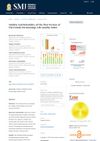TLDR There is a significant need for better-validated quality of life tools in dermatology.
This systematic review evaluated 59 modifications and alternative scoring methods of the Dermatology Life Quality Index (DLQI) across 77 studies involving 25,509 patients from 28 countries. The review found that many modifications lacked comprehensive validation, highlighting the need for further validation to ensure reliability and avoid biases in medical product labeling and reimbursement claims. The DLQI-R scoring and LY-DLQI questionnaire were identified as promising modifications for future validation. The review emphasized the importance of culturally adapted DLQI versions to better assess the quality of life impacts of dermatological conditions, including alopecia, on diverse patient populations.
2 citations
,
March 2015 in “Postępy Nauk Medycznych”  22 citations
,
May 2013 in “Experimental and Therapeutic Medicine”
22 citations
,
May 2013 in “Experimental and Therapeutic Medicine” Minoxidil improves quality of life for women with hair loss.
 82 citations
,
September 2011 in “Quality of Life Research”
82 citations
,
September 2011 in “Quality of Life Research” Choosing the right recall period for patient feedback is important for accurate data and depends on the disease, symptom changes, and patient impact.
90 citations
,
July 2009 in “PTR. Phytotherapy research/Phytotherapy research” Spearmint tea may reduce testosterone and self-reported hair growth in women with PCOS.
10 citations
,
June 2006 in “Clinical and experimental dermatology” Laser hair removal greatly improves quality of life.
8 citations
,
June 2023 in “British Journal of Dermatology” The SAAD-41 scale effectively measures the psychosocial impact of alopecia areata.
 17 citations
,
July 2017 in “International Journal of Behavioral Medicine”
17 citations
,
July 2017 in “International Journal of Behavioral Medicine” The Egyptian Arabic Skindex-16 is a reliable way to measure how skin diseases affect quality of life in Egyptian patients.
 May 2011 in “Value in Health”
May 2011 in “Value in Health” CP-690,550 significantly reduced itching in patients with moderate-to-severe plaque psoriasis.
22 citations
,
August 2020 in “Health and Quality of Life Outcomes” The DLQI is reliable but may not fully capture the impact of skin conditions on quality of life, especially in emotional and psychological areas.
 May 2023 in “Siriraj Medical Journal”
May 2023 in “Siriraj Medical Journal” The Thai version of the Family Dermatology Life Quality Index is a reliable and valid tool for assessing the quality of life of patients' families.




